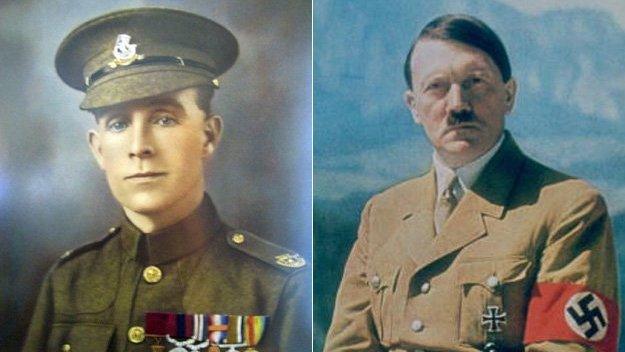World War One: The story of the Welsh boy soldiers
- Published
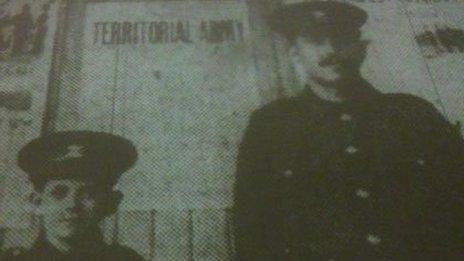
Christopher Llewellyn might have been 12 when he tried to join the Army
As armistice day approaches on the centenary year of the outbreak of World War One, the sacrifice made by those who fought for their country will be remembered.
But while many were drafted into the war effort through conscription, hundreds more too young to fight, were also eager to play their part.
Among them was miner's son Christopher Llewellyn from the Rhondda.
Sir Joseph William Lennox Napier remembers the religious Welsh soldiers with their Bibles
He was so keen to fight in France in World War One he wrote a personal letter to the Welsh Regiment's general.
He was turned down several times for the 5th Battalion at his local recruiting station in Pontypridd in 1915 because he was only 14 years of age. Some records show he may only actually have been 12.
General Sir Edward Cecil Bethune wrote to the territorial association on his behalf to at least get the "very keen lad" accepted as a drummer or bugler with a battalion.
Christopher had the permission of his mother Ruth in Parry Street in Tylorstown, if there was one difficulty to overcome first.
"There was no uniform small enough for him and it had to be specially made," she said.
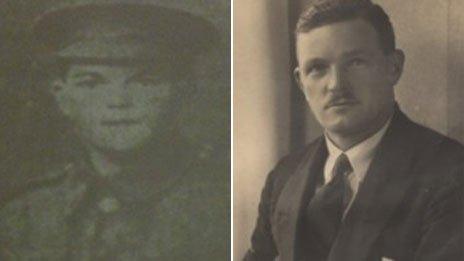
Roy Cadogan Williams managed to get into uniform at 14. He became an optician in later life
Headmaster's son Pte Roy Cadogan Williams did manage to enlist at 14 at around the same time. He left Llantwit Major by train for school one morning but ended up at the recruiting station in Barry.
Pictured proudly in uniform with the Duke of Cornwall's Light Infantry, he expressed his hope his parents would let him continue, while his ambition was to become captain.
It is thought he was sent home as no records appear to exist to show of his exploits. He later became an optician in Cornwall and family today did not know the teenage Roy had even tried to join the Army.
It is hard to calculate how many boy soldiers from Wales joined the ranks from official records - but numbers ran into hundreds. They would claim to be 18 - old enough to enlist - and if they looked big enough or if their luck was in, they would pass muster.

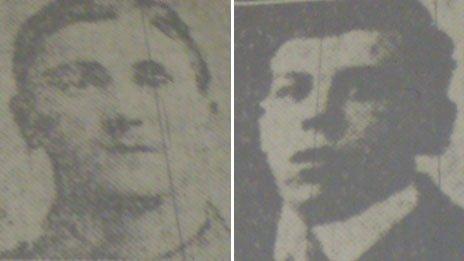
Both Eddy Hookway and Charlie Harrison (right) joined at 15
Pte Eddy Hookway from Penarth was just 15 when he enlisted with the Royal Welsh Fusiliers.
He had taken part in two fierce battles in Gallipoli before he was 17. By rights he should have been 19 before he saw any action.
Before the war, he had worked at the local golf course. But this was a different field of play and he was killed on 4 August 1917.
Reporting his death, his obituary reads: "About the time Pte Hookway died, his mother [Mary] dreamt he had been shot in the shoulder and killed."

Pte Charlie Harrison was another teenager who enlisted early.
The 15-year-old from Cardiff, survived but had an eventful three years. The former delivery boy for WH Smith in Grangetown, joined the Welsh Cyclists Regiment but served in France with the Machine Gun Corps.
He was back home with shell shock and trench fever in 1917, before going back to France, only to suffer gas poisoning.

Pte David Miles, from Llanblethian near Cowbridge was 16 when he enlisted a month after war was declared.
He went to France in January 1915, just turned 17, and was killed in one of the British Army's darkest hours - the disastrous battle of Aubers, which saw 11,000 casualties, most within a few yards of their own trenches.
The quarryman's son was called a "favourite" by his regiment the 2nd Royal Sussex, and described as a "fearless and efficient" soldier.

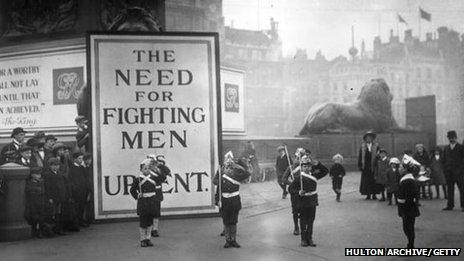
Young boys being used in the recruitment drive - but around 250,000 under age soldiers managed to enlist
Richard van Emden, author of Tommy's War, has researched under-age recruitment, and interviewed many veterans between 1986 and 2004 for his book Boys Of The Great War.
He has calculated 250,000 boys served with the British Army. As well as patriotic duty, it was a chance of adventure.
"These boys were working in coal mines, steelworks and iron foundries - how scary was that at the age of 14 or 15? So the idea of the Army was not so terrifying," he told BBC Wales.
'Blind eye'
"The Army had a poor reputation and so it was not the destination lower middle class parents would want for their sons.
"But to poorer families it was one less mouth to feed and for some there would be the chance of some money as a contribution from their Army wages.
Hear a story from Pte Thomas Phillips about signs the Germans were preparing for war - in west Wales
"There was also the real belief that the war would be over by Christmas. It was a chance to get fit and a bit of exercise that would do them good."
Some boys were so eager to join they would travel from recruitment station to recruitment station to be accepted. Despite some having "paltry chest measurements," sergeants - driven by peaks and troughs in demands - for new blood might not interrogate them about their true age.
"By 1915 they were short of men," said Mr van Emden.
"They needed 35,000 a week and they were getting only 16,000, so if ever a blind eye was shown it was then. And there's a particular time when you see boys enlisting in that year - in July and August coinciding with the school holidays."
- Published7 November 2014
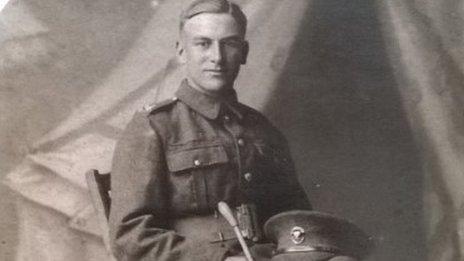
- Published6 August 2014
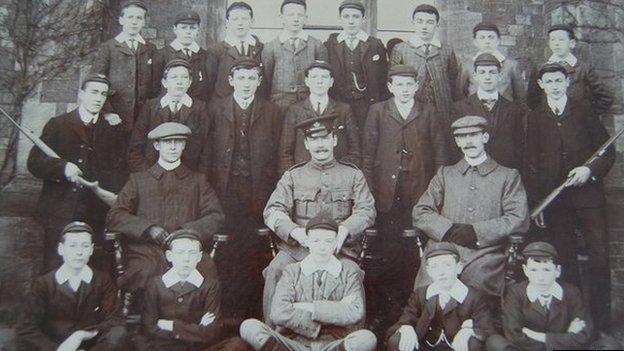
- Published7 August 2014
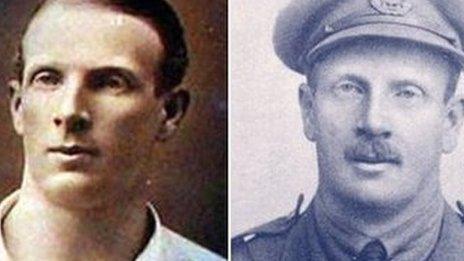
- Published5 November 2018
- Published4 August 2014
